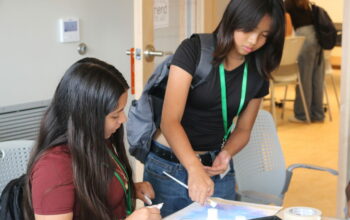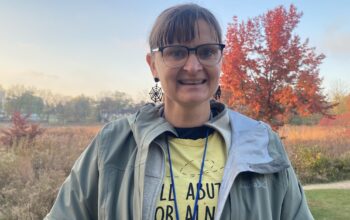Madison Commons reporter, Lauren Thill, interviewed the three candidates running for the Board of Education in Madison. We present the interviews unaltered in transcript form as part of a three-part series. In part two, we present the comments of Anna Moffit, who currently holds Seat 1 on the school board, and has served on the board since 2015. Moffit is running for re-election against Deputy Mayor Gloria Reyes for the Spring Primary election on April 3. Moffit works as a Parent Peer Specialist with Wisconsin Family Ties.

Can you talk about yourself and your experiences?
This is my third year on the board of education, and first up for re-election. Prior to being on the board, I had always been active with the school board. I went to UW-Madison for my Elementary Education degree, and then taught for seven years—mostly second grade. Then I had my oldest and then twins—three kids under two— and so I didn’t go back to teaching. My youngest son was diagnosed with autism, and he was significantly impacted by [autism.] He has verbal and learning challenges, safety challenge and sensory differences. I was then home full-time working to advocate for him, and making sure he got the support he needed. Then I became involved with advocacy at the state-level. I was recommended to apply to Wisconsin Family Ties as a family advocate for children and youth with mental health challenges. Through that work I felt compelled to run for the school board.
What have you learned in your first term on the board? How would you use this knowledge moving forward?
I have a much better understanding of how we use our financial resources and how we use our budgets, and all of the different things the board weighs in on. Before being on the board, I had already been attending meetings for two years, but it can be intense. If you really want to be in there doing things and making changes, it is a tremendous amount of work. I have learned there is a lot of work, and I can commit the time to doing the work. You come in with your own experiences, but you also must be open to different perspectives and experiences. You also need to be willing to compromise and negotiate. We serve such a diverse community, which is wonderful, but we have different groups with different needs, so we have to be mindful to those different needs. We have to focus on moving the needle and moving the district in the right direction and closing the gaps.
What does your previous experience offer the board?
I see policies from an educator’s point of view. Certain policies I see developed when it’s a group of individuals that may not understand how a classroom actually works, policies can be created that are nearly impossible to implement, and then they become ineffective. I have lived experience in the classroom, and I can think about whether [a certain policy] is feasible or sustainable. If it isn’t, we either have to change it or build up our own capacity.
For instance, with the behavior education plan, I share folks’ concerns about it, because there are things within the plan that the staff do not have the capacity to do because of the other demands of their jobs. I know what it feels like when someone that is not in your school comes in and says “This is what we’re going to do now.” We should be looking to our educators to generate ideas, because they are the experts and too often we don’t go to the teachers. That’s very disrespectful.
What can be done at the board level to reduce the achievement gap?
I have a child with a significant mental health need, and I was amazed by the treatment he received in schools versus my kids that didn’t have those same needs. At the district level, we have a complex system of barriers that prevent all kids from accessing the services they deserve.
As a board, we do have the ultimate say on where financial resources go. We need the board to come together and put work toward dismantling the systems have held back certain students and propelled others forward. So conscious policy making, resource allocation, and advocating at a higher level—state and national levels—for well-resourced public schools. We need to focus on getting rid of voucher programs that take our kids out of public schools, because a lot of these private schools do discriminate against a wide variety of needs. We need to be active at pushing back against legislation that hurt our students, and push back against the narrative that teaching is an easy thing to do and that when our kids aren’t being successful it’s because our teachers are failing. As an educator, I know the reason I got into teaching is to help kids. Teachers are not being supported enough to meet the wide range of students' needs. Students are coming to school early on with significant gaps in opportunity and access to community services and supports. Is the community stepping up to support these kids before they get to school and while they’re in school?
Talk about how you advocate for students with disabilities as a board member. Do you have any plans for your second term?
Being a parent for students with learning disabilities, I have lived experience sitting in on meetings and seeing what really happens. If you don’t have a child with a disability, then you really wouldn’t know what’s going on. I can bring those concerns to the board, and I advocate for all students. I want to change attitudes about disabilities and mental health. There is a lot of bias—implicit bias—and a good way to do it is to just to call it out when it’s happening. There’s a big difference between students who are middle-class and wealthy and low-income students in regards to accessing mental health services, which can be nearly impossible.
I want to work on better targeting resources and expanding Building Bridges, which is a partnership with the community that gives families, students and teachers a team to work with and can hook them up to services within the community. I have written an amendment to expand the program, so we can reach more students. We need more financial resources to provide training for our educators to work with students that may have dyslexia who qualify for special education services under “Specific Learning Disability.” If you can afford outside services, kids with dyslexia can get effective targeted intervention. If you don’t have access, you can’t get any resources. This is a place where the district needs to step up and support kids living in poverty. I will focus on bringing in an awareness about how behavior is actually a form of communication. Behavior can communicate a student in crisis or a student with an unmet need.
Any last thoughts?
I am really excited. The first time I ran, I didn’t have an opponent. Moving forward, I want to continue focus on the behavior education plan and moving away from punishment and moving toward restorative practices, expanding access to early education, closing opportunity gaps forming partnerships with businesses and nonprofits, looking at what options are available for students who may not fit into the comprehensive high school model and college track. We should have more opportunities for these students, and more access to vocational and technical education that we haven’t focused on in the past.





